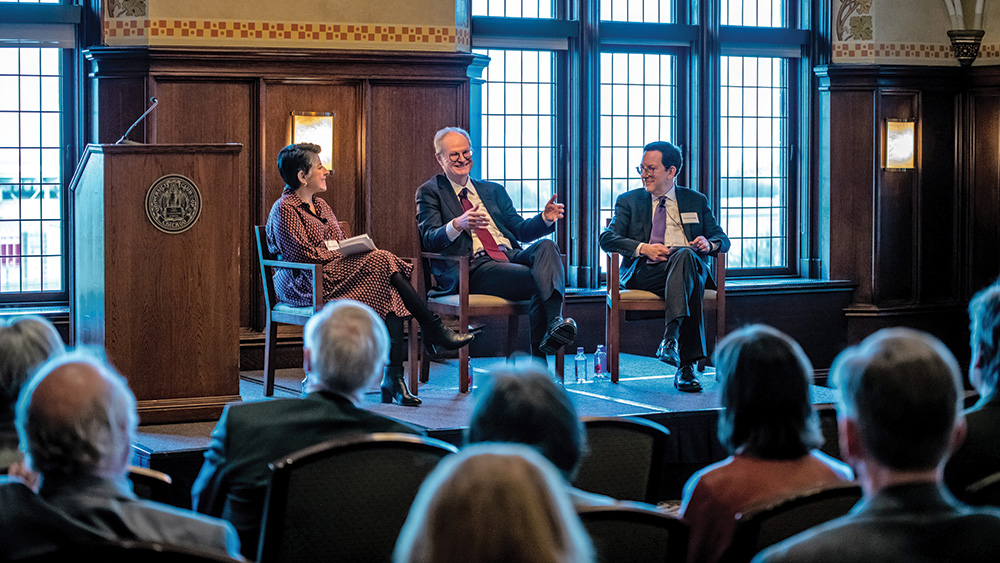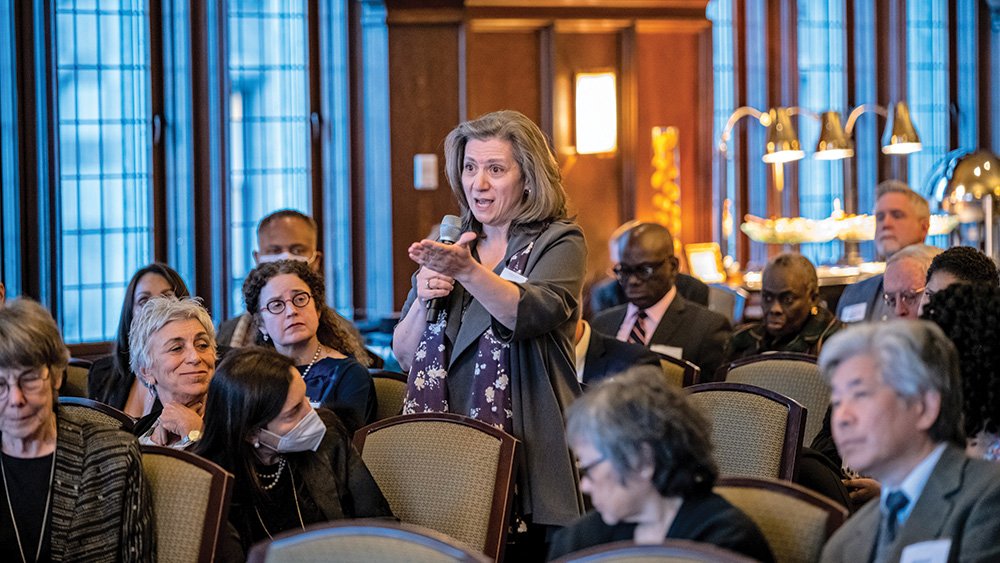By Patrick Meade, Membership Engagement Manager at the Academy
The Chicago area is home to more than three hundred Academy members, who represent dozens of institutions across business, law, philanthropy, government, the arts, and education. The Academy’s 2113th Stated Meeting, Chicago and Its Institutions: What is Our Responsibility to the City? held on April 24, 2023, was an opportunity for members from Evanston to Hyde Park to reconnect, celebrate the election of four new classes of Academy colleagues (2020–2023), and consider a city at a crossroads.
The event, which revealed deep currents of affection, optimism, and a sense of obligation to the city, featured leaders of three of the oldest institutions in the Chicago area. Academy members A. Paul Alivisatos (President, University of Chicago) and Michael H. Schill (President, Northwestern University) joined moderator Andrea Sáenz (President and CEO, The Chicago Community Trust) for a wide-ranging panel conversation that covered community health, public safety, economic development, the racial wealth gap, institutional reputation, government relations, and desegregation, among other topics.
The panelists and attendees considered the scaffolding that universities provide to address problems and create opportunities in the city. The discussion focused on the role of universities as educators, employers, healthcare providers, and producers of new knowledge, reinforcing that there is a broad desire among students, staff, and faculty to apply their talent and resources to the needs of the city. In her opening remarks, Sáenz shared some the challenges facing Chicago, including economic and population growth that lags behind its peer cities and an increase in gun violence that is concentrated almost entirely in neighborhoods with histories of disinvestment and segregation.
Sáenz encouraged the panelists and attendees to reflect on Chicago’s contradictions, in which “world class institutions, a vibrant cultural community, and a thriving business sector” exist alongside communities that experience “unconscionable economic disparities” as a result of decades of divestment and unequal public and private attention. She probed into how established institutions with over one hundred years of history can update their practices and account for past failings, noting that The Chicago Community Trust has evolved its approach from “a charity mindset to a partnership mindset” that requires community-led solutions. Presidents Alivisatos and Schill agreed that, in order to build trust and have a real impact, institutions must take care to be true partners with their neighbors.
Acknowledging that there is always more to do, the panelists discussed existing institutional commitments to the city of Chicago:
- Northwestern University and the University of Chicago both have interdisciplinary labs that are focused on local issues like crime, education, health, and economic opportunity.
- As major research universities, both institutions spur economic development in the city through employment, procurement, research funding, and attracting visitors from around the world.
- Both universities have world class medical centers that serve the community.
- Both universities have partnerships with the Chicago Public Schools to educate the next generation.
- Both universities have prioritized building strong relationships with local government leaders.
- And both institutions foster a knowledge economy that produces evidence-based solutions to the city’s and the world’s most intractable problems.
The conversation revealed a culture of collaboration between Northwestern and the University of Chicago. Alivisatos and Schill recounted how they came together in the earliest days of their presidencies to discuss shared priorities for their respective schools and for the city of Chicago. They pointed to the recently announced Chan Zuckerberg Biohub and existing collaborations with Argonne National Laboratories and Fermi National Accelerator Laboratories as examples of the power of that partnership. They also expressed a commitment to finding more opportunities for their institutions to unite in the near and long-term future.
Alivisatos, Schill, and Sáenz are new in their roles and took their respective offices amid a period of upheaval both in Chicago and nationally. The impacts of the COVID-19 pandemic, the urgency of our nation’s racial reckoning, and the sense that our democracy is imperiled were mentioned over the course of the evening. But they also noted that this is an exciting period of opportunity, with many in the region grappling with their obligations to be of service and motivated to enact real change. The event took place on the eve of the inauguration of a new mayor of Chicago, further contributing to the sense that this is an inflection point for the city.
The panelists and attendees acknowledged that The Chicago Community Trust, Northwestern University, and the University of Chicago are by no means the only relevant institutions in the city. Arts organizations, public schools, libraries, the private sector, hospitals, museums, other universities, and city government all share in the responsibility to the city and need to ensure that their work is in service to the entire community.


